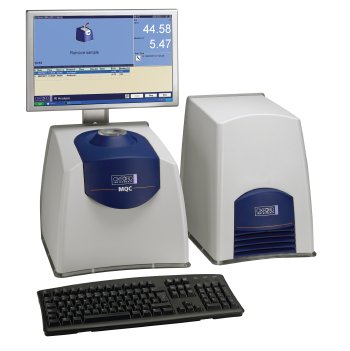Oxford Instruments Magnetic Resonance, the supplier of intelligent benchtop Nuclear Magnetic Resonance (NMR) solutions, will be showcasing its popular MQC analyzers at the American Chemical Society (ACS) National Meeting & Exposition at the Colorado Convention Center in Denver, Colorado, August 28-September 1, 2011.
Selection of instrumentation is about finding the right solution to the analytical challenges of today. While instrument performance is important in the overall purchase decision, it is the total offering from a supplier, that is the ability to perform specific applications to the after sales training and support, that influences today's buyers.
 Oxford Instruments MQC Nuclear Magnetic Resonance Analyzer.
Oxford Instruments MQC Nuclear Magnetic Resonance Analyzer.
Oxford Instruments' MQC benchtop NMR analyzers offer rapid and accurate Quality Control measurements in a compact, easy-to-use package. At ACS, the Oxford Instruments team will be highlighting many applications for the MQC. These include the measurement of oil and moisture in seeds, fat in foodstuffs, hydrogen in fuel, spin finish on textile fibers and fluoride in toothpaste.
The MQC benchtop NMR analyzers are designed to meet the main user requirements of size, reliability, serviceability and ease of use. Packaged applications where the MQC system is supplied complete with all software, hardware and sampling accessories for the task in hand makes training, and hence operation, straight-forward. Even the software is pre-configured providing operating instructions specific to the application.
The MQC benchtop NMR analyzer offers several important advantages over other laboratory analytical techniques. There is minimal sample preparation, samples being loaded into tubes, weighed (if necessary), then measured directly after a short period of temperature equilibration. The MQC takes measurements on the constituent of interest in its natural state. No solvents or other chemicals are required, removing the need for fume cabinets, specially trained staff or expensive disposal procedures. As measurements are performed on the bulk, NMR signals are generated from all parts of the sample, not just the surface, thereby guaranteeing accurate measurements. MQC measurements are generally insensitive to colour, particle size and other physical properties of the samples. As a consequence, calibrations are easy to carry out. Once established, calibrations are robust and need to be repeated infrequently. Most MQC measurements take between a few seconds to a few minutes allowing a high throughput of samples and efficient laboratory operation. Lastly, being a non-destructive technique, NMR measurements do not damage the sample in any way so samples may be stored for re-testing or measured using other techniques.
To learn more about Oxford Instruments' MQC benchtop NMR systems, visit booth number 812 at ACS or the Oxford Instruments web site.